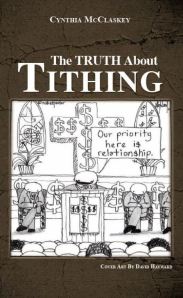 During the early days of Christianity, church leaders all worked and provided for themselves and their families. Offerings were never taken for the maintenance of clergy. The offerings were always distributed to the poor and needy, the widows and orphans, the captives. The corruption, of men taking for themselves from the offerings, didn’t happen until the third century. It was shortly after they started taking a portion of the offerings that they then began to EXACT the monies for their office. God never commanded us, nor showed us by his example, that those who shared the gospel should be partakers of any earthly goods of others. As a matter of fact, scripture tells us that they are not to take from the people (see my book, The Truth About Tithing)! Jesus was a carpenter by trade. Paul was a tentmaker. Other Apostles were fishermen. None of his disciples lived off the offerings they received that were given to help the poor. This corruption, of men living off the backs of the poor through their forced tithes and/or giving, has to be one of the grossest and most blatant misuses of the position of ‘Pastor.’ Many passages have been twisted or overlooked in order to propagate this lie and, my book, The Truth About Tithing, exposes them. Here’s what early church history tells us:
During the early days of Christianity, church leaders all worked and provided for themselves and their families. Offerings were never taken for the maintenance of clergy. The offerings were always distributed to the poor and needy, the widows and orphans, the captives. The corruption, of men taking for themselves from the offerings, didn’t happen until the third century. It was shortly after they started taking a portion of the offerings that they then began to EXACT the monies for their office. God never commanded us, nor showed us by his example, that those who shared the gospel should be partakers of any earthly goods of others. As a matter of fact, scripture tells us that they are not to take from the people (see my book, The Truth About Tithing)! Jesus was a carpenter by trade. Paul was a tentmaker. Other Apostles were fishermen. None of his disciples lived off the offerings they received that were given to help the poor. This corruption, of men living off the backs of the poor through their forced tithes and/or giving, has to be one of the grossest and most blatant misuses of the position of ‘Pastor.’ Many passages have been twisted or overlooked in order to propagate this lie and, my book, The Truth About Tithing, exposes them. Here’s what early church history tells us:
**********
Early Church History to the Death of Constantine
by Edward Backhouse, 1906
MAINTENANCE OF THE CLERGY. We have seen how, in her days of pristine simplicity, the ministers of the Church supported themselves by their own labour. The free-will offerings of the congregation were at first appropriated to the use of the sick and the poor, of orphans, widows and captives. By degrees a portion of the weekly contributions was set apart for the maintenance of the presbyters [pastors]. At a latter period, in some churches a three-fold, in others a four-fold, division was adopted; one share, in the latter case, being appropriated to the bishop, another to the rest of the clergy, a third to the church building and service, and the remainder to the poor. [Notice how the sick, poor, orphans, widows and captives who once received 100% of the offerings are now relegated to only one portion of them. They are the ones that need it the most!]
In the circular issued by the synod of Antioch against Paul [of Samosata], . . . and the Apostolical Constitutions say, “Let the young be diligent in their business, so as to have enough for their own support and to bestow on the needy. For we ourselves besides our attention to the word of the Gospel, do not neglect our inferior employments. Some of us are fishermen, some tentmakers, some husbandmen; for none of those who are dedicated to God ought to be idle.” We have seen in Cyprian’s lamentation over the state of the Church, that the pursuit of trade was not unknown to the African clergy, and was indeed too eagerly followed by some. The council of Elvira forbids the bishops and clergy to be itinerant merchants, but permits them to trade within the province. They were however on no account to exact usury. Even so late as A.D. 398, the fourth Council of Carthage directs that “clergymen, however learned they may be in the divine word, should provide themselves with food and clothing by some handicraft or agricultural labour, but not to the hindrance of their office in the Church; and that such as were strong enough to labour should be instructed in some handicraft and in letters.”
Chrysostom also, about the same time, has described the country clergy around Antioch: “Their language was not Greek but Syriac. They were engaged in agriculture at one time following the plough, at another taking their turn in the pulpit; at one time hedging or cutting thorns with a bill hook, at another sowing the seed of the word; being able to boast of a very small modicum of worldly learning, but yet fairly acquainted with the Holy Scriptures.” “The bishops and presbyters of those early days,” observes Hatch, “kept banks, practised medicine, wrought as silversmiths, tended sheep, or sold their goods in open market. They were like the second generation of non-juring bishops a century and a half ago, or like the early preachers of the Wesleyan Methodists. They were men of the world, taking part in the ordinary business of life. The point about which the Christian communities were anxious was, not that their officers should cease to trade, but that in this as in other respects they should be ensamples to the flock. The chief existing enactments of early councils on the point are, that bishops are not to huckster their goods from market to market, nor are they to use their position to buy cheaper and sell dearer than other people.”
But this liberty was not suffered to continue. The Church had now become subject to the State. It is true we find Theodosius at the end of the fourth century exempting the inferior clergy from the trading tax, provided their mercantile transactions were kept within bounds; but this immunity being abused, all clerical persons whatsoever were by a law of Valentinian III. (A.D. 425-455), interdicted from trade.
The practice of taking fees for the services of the Church, a practice utterly unknown in her days of purity, was not admitted without opposition. In Spain, at the beginning of the fourth century, it had become a common custom to drop a piece of money into the font or box as a gratuity for the rite of baptism. The
Council of Elvira prohibits this custom, assigning this cogent reason, “Lest it be thought that the priest gives for money what he has freely received.” In the same spirit, at a much later period, the Council in Trullo forbids the clergy to receive any thing from the communicants at the Lord s table, because “the grace of God is not an article of merchandise, nor is the sanctification of the spirit to be bought with money.” In like manner Jerome declares it to be unlawful to take a fee for performing the burial service. — Early Church History to the Death of Constantine, pgs 233-235.
**********
According to Backhouse, the third and fourth centuries were where the origin of tithing developed. Iranaeus, Origen and Cyprian began planting the seeds toward tithing by teaching that tithes were similar to ‘first fruits.’ Cyprian even taught that, “on the ground that the tribe of Levi was supported by tithes in order that it might be devoted entirely to the Lord’s service, claims the same inheritance for the Christian clergy, who receive as it were tithes, that they may not depart from the altar (Backhouse).” By equating the office of Bishop and presbyter with the Levite Priest that served in the Temple, it allowed them to also add to the position the same honor, reverence and holiness of the position that the Priest in the Temple held. This also instilled a “fear” of going against the “man of God.” Does any of this sound familiar? Of course it does. Presbyters, Bishops and Priests (or whatever other term used for leadership) attained for themselves a holiness and reverence that was never given them by God. They stole these honors through craftiness in order to benefit and reap personal gain.
The idea had acquired a yet stronger hold in men’s minds by the time of the Apostolical Constitutions where they later added, “As the Levites, who attended upon the tabernacle (in all things a type of the Church), partook of the gifts, offerings, first-fruits, tithes, sacrifices and oblations, so you, O bishops, are, to your people, priests and Levites, ministering to the Holy Tabernacle, the Holy Catholic Church, ye who stand at the altar of the Lord your God, and offer to Him reasonable and bloodless sacrifices through Jesus, the great High Priest. . . . Oblations and tithes belong to Christ and to those who minister to Him. Tenths of salvation are the first letter of the name of Jesus. (Backhouse)”
By deceiving the people into believing that priests, presbyters and bishops were similar to Levite priests that served in the Temple, it allowed the Catholic clergy an avenue into people’s pocketbooks. This one corruption has proliferated down through history and has become so massive, that it has allowed uneducated and self-serving men to enter into the ranks of pastoral leadership while earning salaries that rival many large corporations.
It’s time for clergy to earn their own livings and provide for their own families. Offerings should be dedicated 100% to the poor and needy and not divided between administrative expenses, employee expenses, building expenses, expense accounts for pastors and, pastoral salaries. Christians everywhere should be angry at having their finances siphoned by religious institutions that coerce or force giving and/or tithing through fear of judgment or cursing from God. There is nothing wrong with giving, but there is everything wrong with giving under duress or threat of punishment. Many churches use tithing as a means to determine one’s Christian character and, as a prerequisite for serving in the church! Some churches, like the one I was involved in, would not help you if you were in desperate need of help, if you did not tithe! Tithing was used as a weapon against the poor and needy — the very ones that God COMMANDED we take care of — because they could not afford to tithe. Yet, when the truth is brought to light regarding this lie about maintaining clergy, many will fight against it and, against the one that points out the corruption. Remember, I didn’t invent this truth, I am just pointing out what has already been pointed out by someone else. Maintenance of the clergy is the biggest ponzy scheme this side of heaven. We had better wise up to this lie of the church and start requiring clergy to get a job and support themselves. Imagine how many poor could be helped just with the savings in clergy salaries?






